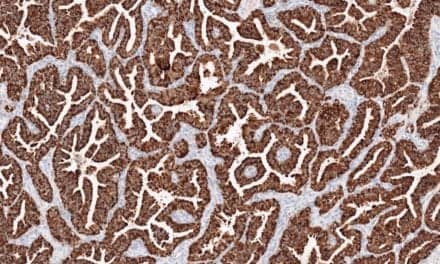Roche, Basel, Switzerland, has announced the global availability of FoundationOne Liquid, a liquid biopsy test. FoundationOne Liquid detects circulating tumor DNA in the blood of people living with cancer and identifies 70 of the most commonly mutated genes in solid tumors, including microsatellite instability, a genomic signature that may help to inform cancer immunotherapy-based treatment decisions.1,2 From a single blood sample, the liquid biopsy offers a quick and convenient option for some patients with solid tumors.3
FoundationOne Liquid meets a compelling need for comprehensive genomic profiling for people who have insufficient or inadequate tissue, including those with advanced non-small cell lung cancer, where an estimated 15% of patients are ineligible for tissue biopsy and another 10% have a biopsy size that is insufficient to evaluate.4–6 FoundationOne Liquid complements FoundationOne CDx, a tissue-based genomic profiling test launched in the United States earlier this year, to deliver a portfolio of comprehensive genomic profiling services for healthcare professionals.
“Cancer is a disease of the genome, and genomic profiling of every patient’s tumor at the start of their treatment journey will provide transformative outcomes for patients,” says Sandra Horning, MD, Roche’s chief medical officer and head of global product development. “At Roche, we believe the use of innovative profiling technologies like FoundationOne Liquid and FoundationOne CDx will improve access to targeted cancer treatments for patients and enrich the future development of targeted medicines.”
FoundationOne CDx is based on the first FDA-approved broad companion diagnostic assay to identify patients with advanced cancer who are likely to respond to targeted therapies based on their individual genomic profile. The Foundation Medicine lab processes tissue samples using next-generation sequencing to analyze the four main classes of genomic alterations, as well as microsatellite instability and tumor mutational burden, using DNA isolated from formalin-fixed paraffin-embedded tumor tissue specimens. The test has been validated with 2,100 clinical samples and 4,200 analytical samples.7 FoundationOne CDx is intended for use by clinicians as decisionmaking support in consideration of a patient’s genomic profile for therapy selection and patient management, according to professional guidelines in oncology.
Foundation Medicine is a molecular information company dedicated to the idea that the genomic changes that contribute to each patient’s unique cancer can inform treatment. A member of the Roche Group, the company offers a full suite of comprehensive genomic profiling tests to identify the molecular alterations in a patient’s cancer and match them with relevant targeted therapies, immunotherapies, and clinical trials. Foundation Medicine’s molecular information platform aims to improve day-to-day care for patients by serving the needs of clinicians, academic researchers, and drug developers to help advance the science of molecular medicine in cancer.
To learn more, visit Foundation Medicine.
References
- FoundationOne Liquid [technical specifications, online]. Cambridge, Mass: Foundation Medicine, 2017. Available at: www.foundationmedicine.com/genomic-testing/foundation-one-liquid. Accessed October 25, 2018.
- Dudley JC, Lin MT, Le DT, Eshelman JR. Microsatellite instability as a biomarker for PD-1 blockade. Clin Cancer Res. 2016;22(4):813–820; doi: 10.1158/1078-0432.ccr-15-1678.
- Clark TA, Chung JH, Kennedy M, et al. Analytical validation of a hybrid capture-based next-generation sequencing clinical assay for genomic profiling of cell-free circulating tumor DNA. J Mol Diagn. 2018;20(5):\686–702; doi: 10.1016/j.jmoldx.2018.05.004.
- Rafael OC, Aziz M, Raftopoulos H, Vele OE, Xu W, Sugrue C. Molecular testing in lung cancer: fine-needle aspiration specimen adequacy and test prioritization prior to the CAP/IASLC/AMP molecular testing guideline publication. Cancer Cytopathol. 2014;122(6):454–458; doi: 10.1002/cncy.21426.
- Douillard JY, Ostoros G, Cobo M, et al. Gefitinib treatment in EGFR mutated caucasian NSCLC: circulating-free tumor DNA as a surrogate for determination of EGFR status. J Thorac Oncol. 2014;9(9):1345–1353; doi: 10.1097/JTO.0000000000000263.
- Kim ES, Hirsh V, Mok T, et al. Gefitinib versus docetaxel in previously treated non-small cell lung cancer (INTEREST): a randomized phase III trial. Lancet. 2008;372(9652):1809–1818; doi: 10.1016/s0140-6736(08)61758-4.
- FoundationOne CDx [online]. Cambridge, Mass: Foundation Medicine, 2017. Available at: www.foundationmedicine.com/genomic-testing/foundation-one-cdx. Accessed October 25, 2018.






